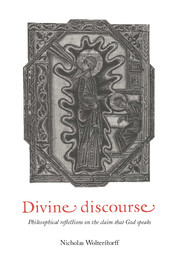Crossref Citations
This Book has been
cited by the following publications. This list is generated based on data provided by Crossref.
Thiselton, Anthony C.
1997.
Speech-Act Theory and the Claim that God Speaks: Nicholas Wolterstorff's Divine Discourse.
Scottish Journal of Theology,
Vol. 50,
Issue. 1,
p.
97.
Keane, Webb
1997.
Religious Language.
Annual Review of Anthropology,
Vol. 26,
Issue. 1,
p.
47.
Abbate, Carolyn
1998.
Debussy's phantom sounds.
Cambridge Opera Journal,
Vol. 10,
Issue. 1,
p.
67.
1998.
Responses to Lloyd Davies' “Covenantal Hermeneutics and the Redemption of Theory”.
Christianity & Literature,
Vol. 47,
Issue. 3,
p.
353.
Levine, Michael
1999.
J.J.C. Smart, and J.J. Haldane, Atheism and Theism. Oxford: Blackwell1996. Pp. vi + 234..
Canadian Journal of Philosophy,
Vol. 29,
Issue. 1,
p.
157.
Westphal, Merold
2000.
Hegel and Onto-Theology.
Bulletin of the Hegel Society of Great Britain,
Vol. 21,
Issue. 1-2,
p.
142.
Fern, Richard L.
2002.
Nature, God and Humanity.
Hope, Samuel A.
2002.
Policy Frameworks, Research, and K-12 Schooling.
Arts Education Policy Review,
Vol. 103,
Issue. 6,
p.
11.
Pauw, J.C.
and
Smit, D.J.
2003.
“The conversation that we are …” – Reflections on Ecumenical Hermeneutics.
South African Journal of Philosophy,
Vol. 22,
Issue. 1,
p.
19.
Webster, John
2003.
Holy Scripture.
2003.
Atheism and Theism.
p.
251.
Moore, Andrew
2003.
Realism and Christian Faith.
Westphal, Merold
2004.
Language and Spirit.
p.
64.
Schultze, Quentin J.
2004.
Faith, Education and Communication Technology.
Journal of Education and Christian Belief,
Vol. 8,
Issue. 1,
p.
9.
2004.
Living Spirit, Living Practice.
p.
77.
Knuuttila, Simo
2004.
Biblical Concepts and Our World.
p.
113.
2004.
Keeping God's Silence.
p.
225.
2004.
Living Spirit, Living Practice.
p.
212.
Pattemore, Stephen
2004.
The People of God in the Apocalypse.
2004.
Living Spirit, Living Practice.
p.
281.





